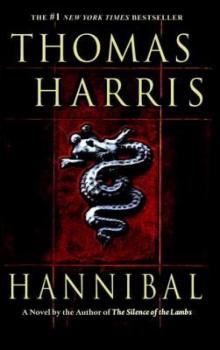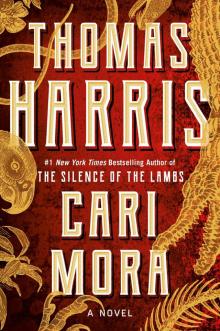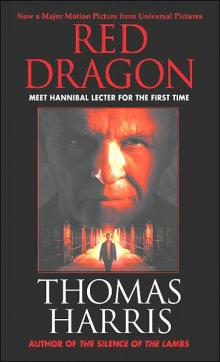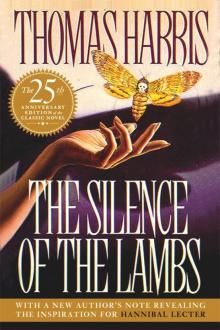- Home
- Thomas Harris
Cari Mora
Cari Mora Read online
The characters and events in this book are fictitious. Any similarity to real persons, living or dead, is coincidental and not intended by the author.
Copyright © 2019 by Thomas Harris
Jacket design by Tal Goretsky
Jacket photographs: Alamy Stock Photo
Cover copyright © 2019 by Hachette Book Group, Inc.
Hachette Book Group supports the right to free expression and the value of copyright. The purpose of copyright is to encourage writers and artists to produce the creative works that enrich our culture.
The scanning, uploading, and distribution of this book without permission is a theft of the author’s intellectual property. If you would like permission to use material from the book (other than for review purposes), please contact [email protected]. Thank you for your support of the author’s rights.
Grand Central Publishing
Hachette Book Group
1290 Avenue of the Americas, New York, NY 10104
grandcentralpublishing.com
twitter.com/grandcentralpub
First Edition: May 2019
Grand Central Publishing is a division of Hachette Book Group, Inc. The Grand Central Publishing name and logo is a trademark of Hachette Book Group, Inc.
The publisher is not responsible for websites (or their content) that are not owned by the publisher.
Excerpt from the English translation of the song “Tuyo” here composed by Rodrigo Amarante, © Narcos Productions LLC. Used by permission.
Library of Congress Cataloging-in-Publication Data
Names: Harris, Thomas, 1940– author.
Title: Cari mora / Thomas Harris.
Description: First edition. | New York ; Boston : Grand Central Publishing, 2019.
Identifiers: LCCN 2018052170| ISBN 9781538750148 (hardcover) | ISBN 9781538700228 (large print) | ISBN 9781549148675 (audio download) | ISBN 9781549148668 (audio book) | ISBN 9781538750131 (ebook)
Classification: LCC PS3558.A6558 C37 2019 | DDC 813/.54—dc21
LC record available at https://lccn.loc.gov/2018052170
ISBNs: 978-1-5387-5014-8 (hardcover), 978-1-5387-5013-1 (ebook), 978-1-5387-0005-1 (international), 978-1-5387-0022-8 (large print), 978-1-5387-5107-7 (special, signed edition)
E3-20190415-NF-DA
Contents
Cover
Frontispiece
Title Page
Copyright
Dedication
Chapter One
Chapter Two
Chapter Three
Chapter Four
Chapter Five
Chapter Six
Chapter Seven
Chapter Eight
Chapter Nine
Chapter Ten
Chapter Eleven
Chapter Twelve
Chapter Thirteen
Chapter Fourteen
Chapter Fifteen
Chapter Sixteen
Chapter Seventeen
Chapter Eighteen
Chapter Nineteen
Chapter Twenty
Chapter Twenty-One
Chapter Twenty-Two
Chapter Twenty-Three
Chapter Twenty-Four
Chapter Twenty-Five
Chapter Twenty-Six
Chapter Twenty-Seven
Chapter Twenty-Eight
Chapter Twenty-Nine
Chapter Thirty
Chapter Thirty-One
Chapter Thirty-Two
Chapter Thirty-Three
Chapter Thirty-Four
Chapter Thirty-Five
Chapter Thirty-Six
Chapter Thirty-Seven
Chapter Thirty-Eight
Chapter Thirty-Nine
Chapter Forty
Chapter Forty-One
Chapter Forty-Two
Chapter Forty-Three
Discover More Thomas Harris
About the Author
Novels by Thomas Harris
Acknowledgments
To Elizabeth Pace Barnes,
who gives me love and lends me wisdom.
Explore book giveaways, sneak peeks, deals, and more.
Tap here to learn more.
Chapter One
Two men talking in the middle of the night. They are 1,040 miles apart. One side of each face is lit by a cell phone. They are two half-faces talking in the dark.
“I can get the house where you say it is. Tell me the rest, Jesús.”
The reply is faint through a crackle of static. “You paid one-fourth of what you promised.” Puff-puff. “Send me the rest of the money. Send it to me.” Puff-puff.
“Jesús, if I find what I want with no more help from you, you will receive nothing from me never.”
“That is truer than you know. That’s the truest thing you ever said in your life.” Puff-puff. “What you want is sitting on fifteen kilos of Semtex…if you find it without my help you will be splattered on the moon.”
“My arm is long, Jesús.”
“It won’t reach down from the moon, Hans-Pedro.”
“My name is Hans-Peter, as you know.”
“You’d put your hand on your peter if your arm was long enough? Is that what you said? I don’t want your personal information. Quit wasting time. Send the money.”
The connection is broken. Both men lie staring into the dark.
Hans-Peter Schneider is in a berth aboard his long black boat off Key Largo. He listens to a woman sobbing on the V-berth in the bow. He imitates her sobs. He is a good mimic. His own mother’s voice comes out of his face, calling the crying woman’s name. “Karla? Karla? Why are you crying, my dear child? It’s just a dream.”
Desperate in the dark, the woman is fooled for a second, then bitter wracking tears again.
The sound of a woman crying is Hans-Peter’s music; it soothes him and he goes back to sleep.
In Barranquilla, Colombia, Jesús Villarreal lets the measured hiss of his respirator calm him. He breathes some oxygen from his mask. Through the common darkness he hears a patient out in the hospital ward, a man crying out to God for help, crying “Jesús!”
Jesús Villarreal whispers to the dark, “I hope God can hear you as well as I can, my friend. But I doubt it.”
Jesús Villarreal calls information on his burner phone and obtains the number of a dance studio in Barranquilla. He pulls his oxygen mask aside to talk.
“No, I am not interested in learning to dance,” he says into the telephone. “I am not dancing at this time. I want to speak to Don Ernesto. Yes you do know him. Say my name to him, he will know.” Puff-puff.
Chapter Two
Hans-Peter Schneider’s boat slid very slowly past the great house on Biscayne Bay, water gurgling along the black hull.
Through his binoculars Hans-Peter watched Cari Mora, twenty-five, in her pajama pants and tank top as she stretched on the terrace in the early morning light.
“My goodness,” he said. Hans-Peter’s canine teeth are rather long and they have silver in them that shows when he smiles.
Hans-Peter is tall and pale, totally hairless. Lacking lashes, his eyelids touched the glass of his binoculars, making smudges. He wiped the eyepieces with a linen handkerchief.
The house-agent Felix stood behind him on the boat.
“That’s her. The caretaker,” Felix said. “She knows the house better than anybody, she can fix things. Learn the house from her and then I’ll fire her smart ass before she can see anything she shouldn’t see. She can save you some time.”
“Time,” Hans-Peter said. “Time. How much longer for the permit?”
“The guy renting the house now is shooting commercials. His permit is good for two more weeks.”
“Felix, I want you to give me a key to that house.” Hans-Peter speaks English wit
h a German accent. “I want the key today.”
“You go in there, something happens, you use my key, they know it’s me. Like O.J.—you use my key, they know it’s me.” Felix laughed alone. “Listen, please, I will go to the renter today, ask him to let it go. You need to see the place in daylight, with people. You have to know it’s a creepy son of a bitch in there. I went through four housekeepers before I got this one. She’s the only one that’s not afraid of it.”
“Felix, you go to the renter. Offer him money. Up to ten thousand dollars. But right now you give me a key or you will be a floater in five minutes.”
“You hurt the bitch, she can’t help you,” Felix said. “She sleeps there. She has to sleep there for the fire insurance. She works other places in the day sometimes. Wait and go in the day.”
“I’m only going to look around. She’ll never know I’m in the house.”
Hans-Peter studied Cari through the glasses. She was on tiptoes filling a bird feeder now. It would be a waste to throw her away. With those interesting scars he could get a lot for her. Maybe $100,000—35,433,184 Mauritanian ouguiya—from the Acroto Grotto Stump Club in Nouakchott. That’s with all her limbs and no tattoos. If he had to customize her for top dollar, with the downtime, it would be more. A hundred and fifty thousand dollars. Chicken feed. There was between twenty-five and thirty million dollars in that house.
In the frangipani tree beside the terrace a catbird sang a song it had learned in the Colombian Cloud Forest and brought north to Miami Beach.
Cari Mora recognized the signature call of an Andean Solitaire that lived fifteen hundred miles away. The catbird sang with great enthusiasm. Cari smiled and paused to listen one more time to the song from her childhood. She whistled to the bird. It whistled back. She went inside the house.
On the boat Hans-Peter held out his hand for the key. Felix put the key on his palm without touching him.
“The doors are alarmed,” Felix said. “But the sunroom door is faulted until we get some parts. It’s the sunroom on the south side of the house. You got some lock picks? For the love of God scratch the tumblers before you use the key, and leave a pick on the steps in case something happens.”
“I will do that for you, Felix.”
“This is not a good idea,” Felix said. “Fuck her up, you lose the knowledge.”
At his car back at the marina, Felix took up the mat in the trunk to get to his burner phone stashed with the jack and tools. He dialed the number of a dance studio in Barranquilla, Colombia.
“No, señor,” he said into the phone, whispering though he was outdoors. “I have delayed him with the permit as long as I can. He has his own lawyer for these things—he will find me out. He will just have the house. That’s all. He knows no more than we do…Yes, I have the deposit. Thank you, señor, I will not fail you.”
Chapter Three
Cari Mora had a variety of day jobs. The one she liked was at the Pelican Harbor Seabird Station, where veterinarians and other volunteers rehabilitate birds and small animals. She maintained the treatment room and sterilized the instruments at the end of the workday. Sometimes with her cousin she catered the station’s boat excursions.
Cari always went early for a chance to work with the animals. The station provided her with scrubs and she liked to wear them because they made her feel medical.
The veterinarians had learned to trust Cari, she was dexterous and careful with the birds, and today, with Dr. Blanco watching, she stitched the gular pouch beneath the beak of a white pelican injured by a fishhook. Pouch stitching is delicate work that must be done in layers, each stitched separately while the bird is anesthetized with gas.
It was peaceful, absorbing work. Very different from her childhood experience, closing soldiers’ wounds in the field with a fast mattress stitch or a tourniquet or a poncho to cover a sucking chest wound, or pressing with her hand while she tore open a compress bandage with her teeth.
At the end of the day the pelican was sleeping it off in a recovery coop, and Dr. Blanco and the others had gone home.
Cari took an organic rat out of the freezer to thaw while she put the treatment room in order and refreshed the water in the outside flyways and pens.
When she had finished the room and sterilized the instruments, she opened a tamarind cola for herself and took the defrosted rat out to the wire-enclosed pens and flyways.
The great horned owl was on a perch in the high far corner of its flyway. She put the rat carcass through the wire onto a narrow shelf. She closed her eyes and tried to hear the owl coming before the wind from its great wings washed over her. The big bird never lit, but plucked up the food with one of its X-shaped feet and silently beat back up to its perch, where it opened its beak and throat startlingly wide and threw down the rat in one gulp.
The great horned owl was a permanent resident of the Seabird Station. It could never be released as it had lost an eye in an accident with a power line and could not hunt, but it could fly very well. The owl was a popular visitor to the city schools for nature talks, where it put up with the close scrutiny of hundreds of schoolchildren, sometimes closing its one great eye and dozing during the lectures.
Cari sat on her overturned bucket with her back against the wire, under the scrutiny of the booby across the way recovering from a cut between its toes. Cari had closed the cut with a neat pulley stitch the vets had taught her.
In the nearby marina, the boats were lighting up and cozy couples were cooking in their galleys.
Caridad Mora, child of war, wanted to be a veterinarian. She had lived in the United States nine years on a shaky Temporary Protected Status, and her TPS could be canceled at any time by a governmental tantrum in the current sour atmosphere.
In the years before the immigration crackdown she had gotten a general equivalency high school diploma. She quietly added a home health aide license with the short six-week course plus her considerable life experience. But to go further in school she would have to show better papers than she had. The migra—ICE—was always watching.
In the short tropic twilight she took the bus back to the big house on the bay. It was almost dark when she got there, the palms already black against the last light.
She sat for a little while beside the water. The wind off the bay was full of ghosts tonight—young men and women and children who had lived or died in her arms as she tried to stanch their wounds, had fought to breathe and lived, or shivered out straight and gone limp.
Other nights the wind batted lightly at her like the memory of a kiss, of eyelashes brushing her face, sweet breath on her neck.
Sometimes this, sometimes that, but always the wind was full.
Cari sat outside listening to the frogs, the many-eyed lotus in the pond watching her. She watched the entrance hole of an owl house she had made out of a wooden crate. No face appeared yet. Tree frogs were peeping.
She whistled the song of the Andean Solitaire. No bird replied. She felt a little empty as she went inside in the hard time of day when you eat alone.
Pablo Escobar had owned this house, but he never lived here. Those who knew him thought he bought it for family to use if he was ever extradited to the United States.
The house had been in and out of the legal system since Escobar’s death. A series of playboys and fools and real estate speculators had owned it over the years—plungers who bought it from the courts and held on to it for a little while as their fortunes went up and down. The house was still full of their follies: movie props, monster mannequins, everything lunging and reaching. There were fashion mannequins, lobby cards, jukeboxes, horror-film props, some sex furniture. In the living room was an early electric chair from Sing Sing that had only killed three, its amperage last adjusted by Thomas Edison.
A progression of lights on and off up through the house as Cari made her way through the mannequins, the crouching movie monsters, the seventeen-foot Mother Alien from the Planet Zorn to reach her bedroom at the top of the stairs. A last lig
ht in her bedroom winked out.
Chapter Four
With Felix’s key in hand, Hans-Peter Schneider could creep the house in Miami Beach as he was dying to do. He could creep it with the girl Cari Mora asleep in her hotness upstairs.
Hans-Peter was in his living quarters in an unmarked warehouse on Biscayne Bay near the old Thunderboat Alley in North Miami Beach, his black boat tied up in the adjacent boathouse. He sat naked on a stool in the center of his tiled shower room, letting the many nozzles on the walls beat water on him from all directions. He was singing in his German accent: “…just singing in the rains. What a glorious feeling, I am haaaappy again.”
He could see his reflection in the glass side of his liquid cremation machine where he was dissolving Karla, a girl who hadn’t worked out for business.
In the rising mist Hans-Peter’s image on the glass looked like a daguerreotype. He struck the pose of Rodin’s The Thinker and watched himself out of the corner of his eye. A faint smell of lye rose with the steam.
Interesting to see himself as The Thinker reflected on the glass, while behind the glass, in the tank, Karla’s bones were beginning to stand up out of the paste the corrosive lye water had made of the rest of her. The machine rocked, sloshing fluid back and forth. The machine burped and bubbles came up.
Hans-Peter was very proud of his liquid cremation machine. He’d had to pay a premium for it, as liquid cremation was becoming all the rage with ecology enthusiasts eager to avoid the carbon footprint of cremation by fire. The liquid method left no carbon footprint, or print of any kind. If a girl did not work out, Hans-Peter could just pour her down the loo in liquid form—and with no harmful effect on the groundwater. His little work song was:
“Call Hans-Peter—that’s the name!—and away go troubles down the drain—Hans-Peter!”
Karla had not been a total loss—she had provided Hans-Peter with some amusement and he was able to sell both her kidneys.
Hans-Peter could feel the pleasant heat from his cremation machine radiate across the shower room, though he kept the temperature of the lye water at only 160 degrees Fahrenheit to prolong the process. He enjoyed watching Karla’s skeleton emerge slowly from her flesh, and, like a reptile, he was drawn to warmth.

 The Silence of the Lambs
The Silence of the Lambs Red Dragon
Red Dragon Hannibal
Hannibal Black Sunday
Black Sunday Cari Mora
Cari Mora Hannibal Rising
Hannibal Rising Red Dragon hl-1
Red Dragon hl-1 The Silence of the Lambs (Hannibal Lecter)
The Silence of the Lambs (Hannibal Lecter)